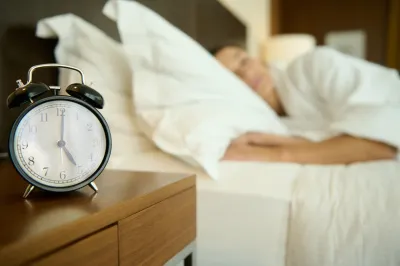How to Find Your Sleep Duration ‘Sweet Spot’ & Why It Matters
Sleepme Editorial Team • Sep 08, 2022

Key Takeaways
- Personalized Sleep: Your ideal sleep duration isn't one-size-fits-all—it's based on your biology, habits, and health.
- Sleep Tracking: Using tools like the Sleepme sleep tracker helps you analyze patterns and fine-tune your nightly hours.
- Quality Over Quantity: It's not just how long you sleep, but how well. Deep, restorative sleep matters more than just clocking 8 hours.
- Signs You Need More: Morning grogginess, afternoon crashes, or constant yawning? These could be signs you're undersleeping.
- Experiment Smartly: Use a 15-minute-up-or-down method over a week to dial in the sweet spot for your sleep needs.
Sleep isn't just a nightly ritual—it’s a cornerstone of your health, energy, mood, and even your metabolism. But figuring out how many hours you actually need? That’s where it gets tricky. Whether you're someone who swears by 6 hours or someone who needs a solid 9 to feel human, sleep duration isn't one-size-fits-all.
Below, we’ll explain what sleep duration means, why it matters, how it changes with age, and what happens when you get too little or too much. Plus, we’ll walk you through practical tips to dial in your perfect sleep schedule and show you how tracking your sleep (hello, tech!) can help you optimize both quality and quantity.
We’ll dive into the science, debunk the myths, and help you find your sweet spot for better sleep and better health.
What is Sleep Duration?
Sleep duration is a critical aspect of overall health, with the amount of sleep an individual gets each night playing a significant role in their physical and mental well-being. The National Sleep Foundation and the American Academy of Sleep Medicine have conducted extensive research on sleep patterns, highlighting the importance of getting enough sleep for healthy adults.
According to the Sleep Research Society, the recommended amount of sleep varies by age group, with different age groups requiring different amounts of sleep to promote optimal health. Knowing how much sleep you need—and what disrupts it—is key to keeping your sleep game strong and your health on track.
Recommended Amount of Sleep: How Many Hours
Sleep duration refers to the total amount of time you spend asleep during the night. The National Sleep Foundation recommends the following hours of sleep per night based on age:
- Newborns (0-3 months): 14-17 hours of sleep
- Infants (4-11 months): 12-15 hours of sleep
- Toddlers (1-2 years): 11-14 hours of sleep
- Preschoolers (3-5 years): 10-13 hours of sleep
- School-age children (6-13 years): 9-11 hours of sleep
- Teenagers (14-17 years): 8-10 hours of sleep
- Adults (18-64 years): 7-9 hours of sleep
- Older adults (65+ years): 7-8 hours of sleep
Keep in mind, these are general sleep duration recommendations. In clinical sleep medicine, expert panels regularly review and update them based on the latest research, so while they're rooted in science, they’re more like well-informed benchmarks than strict rules.
Skimping on sleep doesn’t just leave you groggy—it’s been tied to serious health issues like obesity, diabetes, and brain fog. Logging at least 7 hours a night can help cut those risks, while sticking to a consistent sleep schedule keeps your body and mind running at their best.
Clocking less than 7 hours of sleep a night? That’s what experts call short sleep—and it’s been tied to weight gain and metabolic issues. But here’s the kicker: it’s not just about how much you sleep, but how well you sleep.
Prioritizing quality over sheer quantity can make all the difference when it comes to your overall health and energy.
Factors Affecting Sleep Needs
Sleep needs aren’t one-size-fits-all—they shift based on age, lifestyle, and overall health. Younger adults usually need more shut-eye than older folks, and if you’re dealing with a sleep disorder, you might need extra rest to make up for poor-quality sleep.
According to the American Academy of Sleep Medicine, things like caffeine habits, exercise levels, and mental health can all play a role in how much sleep your body actually needs.
Your sleep habits matter, big time. Sticking to a consistent sleep schedule and creating a restful environment can significantly improve both the quality and quantity of your sleep. Even metrics like how quickly you fall asleep (sleep onset) and how long it takes to do so (sleep latency) are influenced by these daily routines.
Sleep Needs Across the Lifespan
Sleep needs vary significantly across the lifespan, with different age groups requiring different amounts of sleep. Infants and young children need a lot of sleep to support growth and development, while older adults tend to need less sleep due to changes in sleep architecture and sleep consolidation.
The National Sleep Foundation notes that sleep needs can also be influenced by factors such as physical health, mental health, and lifestyle. For example, pediatric populations may require more sleep due to the demands of growth and development, while older adults may need to adjust their sleep schedules to accommodate age-related changes in sleep patterns.
Understanding sleep needs across the lifespan is essential for promoting optimal health and reducing the risk of sleep-related disorders.
Steps to Determine How Much Sleep You Need
Ready to dial in your perfect sleep schedule? Here are some simple, science-backed steps to help you figure out exactly how much sleep you need to feel your best.
Track Your Sleep Patterns
Want to figure out your ideal sleep sweet spot? Start by monitoring your patterns. Keep a sleep diary for at least two weeks—note when you go to bed, when you wake up, and how you feel each morning.
Or better yet, let tech do the heavy lifting. The non-wearable Sleep Tracker by Sleepme gives you precise, real-time insights into your sleep duration, quality, and trends—no wristbands required. It’s like having a sleep coach built into your bed.
Listen to Your Body
If you're dragging through the day, snapping at emails, or zoning out in meetings, your sleep might be to blame. On the flip side, if you wake up feeling clear-headed and ready to roll, you’re probably hitting your sleep sweet spot. Your body’s cues are like real-time feedback—pay attention, and they’ll point you in the right direction.
Experiment with Sleep Duration
Finding your ideal sleep duration is all about fine-tuning. Start by picking a consistent wake-up time, then adjust your bedtime in small 15–30 minute increments—earlier or later—and track how you feel. Notice changes in your energy, mood, and focus throughout the day. It's like A/B testing for your sleep.
Consider Your Lifestyle
How you spend your day shapes how much rest you need at night. Crushing workouts or juggling a high-stress job? Your body may need extra sleep to bounce back. If your days are more low-key or sedentary, you might get by with a bit less. Think of sleep as recovery fuel—your lifestyle sets the demand.
Listen to Your Circadian Rhythm
Your body has a natural sleep-wake cycle known as the circadian rhythm. Try to align your sleep schedule with your body's natural tendencies. Going to bed and waking up at the same time every day can help regulate your sleep patterns.
The Risks of Excessive Sleep
While getting enough sleep is essential for good health, excessive sleep can also have negative consequences. Long sleep duration, defined as sleeping more than 9 hours per night, has been linked to an increased risk of chronic diseases such as high blood pressure, coronary heart disease, and obesity.
The American Academy of Sleep Medicine notes that excessive sleep can also be a sign of underlying sleep disorders, such as sleep apnea or insomnia. Additionally, excessive sleep can impact cognitive function, mood, and overall quality of life. The Sleep Research Society highlights the importance of promoting optimal sleep duration and reducing the risk of excessive sleep to maintain good sleep health and overall well-being.
By understanding the risks of excessive sleep and promoting healthy sleep habits, individuals can reduce their risk of sleep-related disorders and maintain optimal health.
Tips for Improving Sleep Quality
These practical tips can help you boost sleep quality and wake up feeling genuinely refreshed.
- Create a Sleep-Friendly Environment: Make your bedroom a haven for great sleep. Keep it dark, quiet, and cool. Blackout curtains, earplugs, or a white noise machine can help block out distractions and set the stage for deeper, uninterrupted sleep.
- Establish a Relaxing Bedtime Routine: Set the tone for sleep with a wind-down ritual. Whether it’s reading a book, meditating, stretching, or a warm bath, these calming activities signal to your body that it’s time to power down. A consistent bedtime routine helps shift your brain from hustle mode to rest mode—so you’re not bringing the day’s chaos under the covers.
- Limit Screen Time: The blue light emitted by screens can interfere with your ability to fall asleep. Try to avoid screens for at least an hour before bedtime.
- Be Mindful of Food and Drink: Avoid large meals, caffeine, and alcohol close to bedtime, as they can disrupt your sleep.
- Consider Sleep Technology: Devices like sleep trackers can provide insights into your sleep patterns, understand the duration of sleep, and help you make informed adjustments. For more information on how technology can enhance your sleep, check out our post on the benefits of sleep technology.
For a full list, take a look at our blog listing 13 expert tips on how to improve your sleep.
Final Thought
Nailing down your ideal sleep duration isn’t a one-size-fits-all deal—it’s a personal process of tuning into your body and figuring out what truly works for you. By tracking your sleep, noticing how you feel during the day, and making small tweaks, you can land on the sweet spot that leaves you energized, focused, and feeling good.
Just don’t forget: sleep isn’t just about clocking hours. The quality of your rest is just as crucial as the quantity. Prioritize both, and you’ll be setting yourself up for better health, sharper thinking, and smoother days.
Frequently asked questions
How Can I Determine My Optimal Sleep Duration?
To find your sleep "sweet spot," aim for a consistent sleep duration between 6 to 8 hours per night. This range is associated with stable cognitive performance and overall health. Avoid the cycle of sleep deprivation followed by oversleeping, as consistency is key to maintaining optimal sleep health.
Why Is Consistency in Sleep Important?
Consistent sleep patterns help regulate your body's internal clock, leading to better sleep quality and overall health. Irregular sleep schedules can disrupt circadian rhythms, leading to issues like insomnia or hypersomnia. Establishing a regular bedtime and wake-up time supports optimal cognitive function and physical well-being.
What Strategies Can Help Maintain Consistent Sleep Patterns?
- Set a Regular Sleep Schedule: Go to bed and wake up at the same times daily, even on weekends.
- Create a Relaxing Bedtime Routine: Engage in calming activities before bed to signal your body it's time to sleep.
- Limit Exposure to Screens Before Bed: Reduce blue light exposure from devices at least an hour before bedtime.
- Avoid Caffeine and Heavy Meals Late in the Day: These can interfere with your ability to fall asleep.
- Keep Your Sleep Environment Comfortable: Make sure your bedroom is quiet, dark, and cool to promote restful sleep.
Citations/References
[1] Brendan P Lucey, Julie Wisch, Anna H Boerwinkle, Eric C Landsness, Cristina D Toedebusch, Jennifer S McLeland, Omar H Butt, Jason Hassenstab, John C Morris, Beau M Ances, David M Holtzman, Sleep and longitudinal cognitive performance in preclinical and early symptomatic Alzheimer’s disease, Brain, Volume 144, Issue 9, September 2021, Pages 2852–2862, View Study
[2] Winer JR, Deters KD, Kennedy G, et al. Association of Short and Long Sleep Duration With Amyloid-? Burden and Cognition in Aging. JAMA Neurol. 2021;78(10):1187–1196. doi:10.1001/jamaneurol.2021.2876









